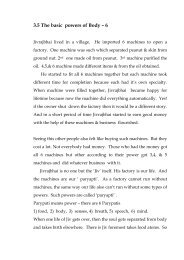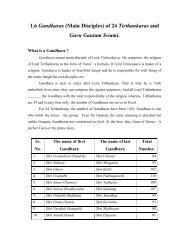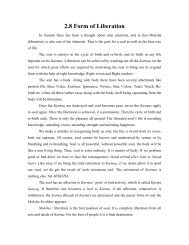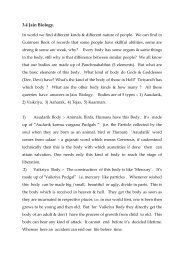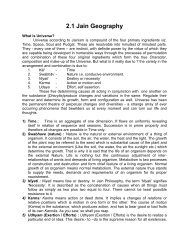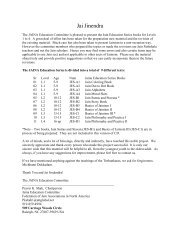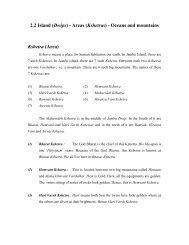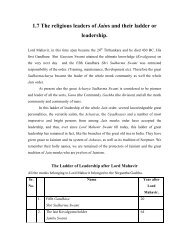Can you name the bad leshyas? - Jainism, Jain Religion - colleges
Can you name the bad leshyas? - Jainism, Jain Religion - colleges
Can you name the bad leshyas? - Jainism, Jain Religion - colleges
Create successful ePaper yourself
Turn your PDF publications into a flip-book with our unique Google optimized e-Paper software.
<strong>Can</strong> <strong>you</strong> <strong>name</strong> <strong>the</strong> best Leshya?<br />
Shukla (White) Leshya.<br />
<strong>Can</strong> <strong>you</strong> <strong>name</strong> <strong>the</strong> <strong>bad</strong> <strong>leshyas</strong>?<br />
Krishna (Black) Leshya<br />
Neel (Blue) Leshya<br />
Kapot (Brown) Leshya.<br />
<strong>Can</strong> <strong>you</strong> <strong>name</strong> <strong>the</strong> good <strong>leshyas</strong>?<br />
Tejo (Red) Leshya<br />
Padma (Yellow) Leshya<br />
Shukla (White) Leshya.<br />
What is <strong>the</strong> characteristic of Krishna (Black) Leshya?<br />
A person who shows no compassion at all, and does not show even a slightest mercy. Everyone<br />
is afraid of him. His anger soon turns into violence. He always burns with jealousy and anger.<br />
He is filled with animosity and malice. He does not believe in <strong>the</strong> religion.<br />
Where does a person get born if he/she dies while in <strong>the</strong> Krishna<br />
(Black) Leshya?<br />
If he dies in this state of mind, he will go to <strong>the</strong> hell.<br />
What is <strong>the</strong> characteristic of Neel (Blue) Leshya?<br />
A person is burning with pride and is very haughty. He is not reliable. People avoid his company.<br />
He is a lazy, a cheater, and a hypocrite. He avoids <strong>the</strong> religious lectures. He is a coward and<br />
filled with passions.<br />
Where does a person get born if he/she dies while in <strong>the</strong> Neel (Blue) Leshya<br />
?<br />
If he dies in this state of mind, he would be born as a plant.<br />
What is <strong>the</strong> characteristic of Kapot (Brown) Leshya?<br />
A person is always sad, and gloomy and dejected. He finds fault in o<strong>the</strong>rs and is vindictive. He<br />
does not spare even <strong>the</strong> noble souls. He boasts of himself. He is excited over small matters. He<br />
lacks mental balance.<br />
Where does a person get born if he/she dies while in <strong>the</strong> Kapot (Brown)<br />
Leshya?<br />
If he dies in this state of mind, he would be reborn as a bird, or an animal.<br />
What is <strong>the</strong> characteristic of Tejo (Red) Leshya?<br />
A person is very careful about his actions, and discriminates between good and evil. He is afraid<br />
of doing <strong>bad</strong> deeds. He is kind benevolent, and religious. He has a balanced personality. He<br />
leads a harmonious life.<br />
Where does a person get born if he/she dies while in <strong>the</strong> Tejo (Red)<br />
Leshya?<br />
If he dies in this state of mind, he will be reborn as a human being.
What is <strong>the</strong> characteristic of Padma (Yellow) Leshya?<br />
A person who is kind and benevolent and forgives even his enemies. He observes some<br />
austerities. He is very conscious and vigilant in keeping his vows. When asked for <strong>the</strong> help even<br />
by his enemy, he helps <strong>the</strong>m. He does not lose his balance in pleasure or pain. He is always<br />
cheerful.<br />
Where does a person get born if he/she dies while in <strong>the</strong> Padma (Yellow)<br />
Leshya?<br />
If he dies in this leshya, he will be born in heaven as a demigod.<br />
What is <strong>the</strong> characteristic of Shukla (White) Leshya?<br />
A person having no attachment or hatred; whatsoever, treats everyone alike. He is trustworthy.<br />
He treats every soul as his own soul. He remains immersed in soul experience and selfrealization.<br />
Where does a person get born if he/she dies while in <strong>the</strong> Shukla<br />
(White) Leshya?<br />
If he dies in this state of mind, he will be liberated from <strong>the</strong> cycle of birth and death.<br />
<strong>Can</strong> a person's leshya change?<br />
Yes, leshya can change within a fraction of a second, too.<br />
Does leshya play a role in accumulation of karmas?<br />
Yes, leshya brings <strong>the</strong> mental tendency which in turn causes actions. So, leshya does play part<br />
in accumulating, as well as, shedding karmas.<br />
What is <strong>the</strong> Pratikraman?<br />
This is a process of repentance (prayschitta) during which we repent for our wrongful doing<br />
during our daily life, and remind us to restrain from doing so again. This helps us to bring back<br />
<strong>the</strong> soul that has lost its way in <strong>the</strong> meshes of outward actions and pursuits.<br />
How many times should one do <strong>the</strong> Pratikraman in a day?<br />
As a <strong>Jain</strong> if possible, one should do pratikramans twice a day.<br />
What are <strong>the</strong> different Pratikramans?<br />
There are five different types:<br />
1) Devasi Pratikraman:<br />
2) Rayi Pratikraman:<br />
3) Pakhi Pratikraman:<br />
4) Chomasi Pratikraman:<br />
5) Samvatsari Pratikraman:<br />
What does Devasi Pratikraman mean?<br />
Devasi pratikraman is performed daily in <strong>the</strong> evening to ask for <strong>the</strong> forgiveness of sins committed<br />
during <strong>the</strong> daytime.<br />
What does Raysi Pratikraman mean?<br />
Raysi Pratikraman is performed in <strong>the</strong> early morning to ask for <strong>the</strong> forgiveness for <strong>the</strong> sins<br />
committed during <strong>the</strong> nighttime.
What does Pankhi Pratikraman mean?<br />
Pakhi Pratikraman is done once in 15 days.<br />
What does Caumasi Pratikraman mean?<br />
The Chaumasi Pratikraman is done once in four months on poonam (full moon day) of 1) Kartik,<br />
2) Falgun and 3) Ashadh months of lunar calendar year for <strong>the</strong> sins committed during that period.<br />
What does Samvatsari Pratikraman mean?<br />
The Samvatsari Pratikraman is done once in a year on <strong>the</strong> last day of paryushan i.e., on <strong>the</strong> fifth<br />
day of <strong>the</strong> bright fortnight of Bhadrapada for <strong>the</strong> sins committed during <strong>the</strong> whole year.<br />
What is <strong>the</strong> Samgna?<br />
Samgna means natural tendency of <strong>the</strong> soul.<br />
<strong>Can</strong> <strong>you</strong> <strong>name</strong> some Samgnas?<br />
• Ahar Samjna<br />
• Bhay Samjna<br />
• Maithun Samjna<br />
• Parigraha Samjna<br />
• Krodha Samjna<br />
• Maan Samjna<br />
• Maya Samjna<br />
• Lobha Samjna<br />
• Ogha Samjna<br />
• Loka Samjna<br />
What is <strong>the</strong> Kashaya?<br />
Kashaya means passions which make <strong>the</strong> soul wander in this worldly<br />
life.<br />
<strong>Can</strong> <strong>you</strong> <strong>name</strong> <strong>the</strong> Kashayas?<br />
Kashayas are:<br />
• Krodha (anger)<br />
• Mana (ego)<br />
• Maya (deceit)<br />
• Lobha (greed).<br />
What is meant by <strong>the</strong> Samiti?<br />
Samiti means Carefulness.<br />
How many types of Samities are <strong>the</strong>re?<br />
Five<br />
<strong>Can</strong> <strong>you</strong> <strong>name</strong> five Samities?<br />
1. Irya-samiti<br />
2. Bhasha-samiti<br />
3. Eshana-samiti<br />
4. Adan-nikshepan Samiti<br />
5. Parishtapanika Samiti
What does <strong>the</strong> Irya Samiti mean?<br />
Carefulness in movement<br />
Moving about, going anywhere, or returning with an absolute care and alertness so that no harm,<br />
pain or any injury is caused to even to any small creature.<br />
What does <strong>the</strong> Bhasa Samiti mean?<br />
Carefulness in speech<br />
Not uttering anything that is disagreeable to anyone or that could cause pains in <strong>the</strong> heart of<br />
anyone; but ra<strong>the</strong>r speak such words as to create please in o<strong>the</strong>rs. Words are sweet and soft in<br />
manner<br />
What does <strong>the</strong> Eshana Samiti mean?<br />
Carefulness of taking food<br />
Accepting food as prescribed per <strong>Jain</strong> principles so it would be faultless.<br />
What does <strong>the</strong> Adan-Nikshepan Samiti mean?<br />
Carefulness clo<strong>the</strong>s and o<strong>the</strong>r articles of daily use<br />
Take utmost care before using clo<strong>the</strong>s to make sure that <strong>the</strong>re are no insects in <strong>the</strong> folds which<br />
may be crushed, hurt, or killed. Care must be also taken before taking and putting away vessels,<br />
books, or sitting down, etc.<br />
What is meant by <strong>the</strong> Parishtapanika Samiti?<br />
Be careful about how, and where one disposes of trash, refuse, or excretions so that no harm is<br />
done to even <strong>the</strong> minute insects or bugs.<br />
What does <strong>the</strong> Gupti mean?<br />
Guptis means restraints.<br />
How many different types of Gupties are <strong>the</strong>re?<br />
Three<br />
<strong>Can</strong> <strong>you</strong> <strong>name</strong> different types of Gupties?<br />
Mano Gupti<br />
Vachan Gupti<br />
Kaya Gupti<br />
What does <strong>the</strong> Mano Gupti mean?<br />
Restraint of <strong>the</strong> mind<br />
Not to entertain any evil thoughts; and freeing <strong>the</strong> mind from sinful inclinations.<br />
What does <strong>the</strong> Vachan Gupti mean?<br />
Restraint on speech<br />
Not to utter any evil, disagreeable or unnecessarily and practicing silence.<br />
What does <strong>the</strong> Kaya Gupti mean?<br />
Restraint on <strong>the</strong> body<br />
Not to perform any physical activities which could cause pain suffering or injury.<br />
What does <strong>the</strong> Vandana mean?<br />
Vandana means bowing down to pay reverence.
What do <strong>you</strong> gain by <strong>the</strong> Vandana?<br />
By doing vandana, one becomes humble, and acquires Uchcha Gotra Karma.<br />
What are <strong>the</strong> two things which polute <strong>the</strong> soul?<br />
Rag (attachment) and Dwesh (hatred)<br />
What does <strong>the</strong> Rag mean?<br />
Rag menas attachment.<br />
What does <strong>the</strong> Dwesh mean?<br />
Dwesh means hatred.<br />
What does <strong>the</strong> Samjna mean?<br />
Samjna means tendencies.<br />
What does <strong>the</strong> Ahar Samjna mean?<br />
Tendency for food<br />
What does <strong>the</strong> Bhaya Samjna mean?<br />
Tendency to fear<br />
What does <strong>the</strong> Maithun Samjna mean?<br />
Tendency for sex<br />
What mean does <strong>the</strong> Parigraha Samjna mean?<br />
Tendency for collection of material things<br />
What does <strong>the</strong> Lobha Samjna mean?<br />
Tendency for avarice<br />
What does <strong>the</strong> Maya Samjna mean?<br />
Tendency to deceive<br />
What does <strong>the</strong> Maan Samjna mean?<br />
Tendency to be arrogant<br />
What does <strong>the</strong> Krodha Samjna mean?<br />
Tendency for anger<br />
What does <strong>the</strong> Ogh Samjna mean?<br />
The tendency to imitate<br />
What is <strong>the</strong> Praman?<br />
Praman is to see an object from many points of view and to understand it comprehensively.<br />
Praman is that by which, <strong>the</strong> real nature and form of an object can be understood. There are four<br />
kinds of it.
What is <strong>the</strong> Pratyaksha Praman?<br />
Actual observation<br />
Pratyaksh Praman means seeing an object and obtaining a knowledge of it; and determining its<br />
form and nature.<br />
What is <strong>the</strong> Anuman Praman?<br />
Evaluation<br />
Anuman means thinking of an object and to understand it by means of evaluation.<br />
What is <strong>the</strong> Upama Praman?<br />
By means of comparison<br />
Upama is to obtain <strong>the</strong> knowledge of an object by comparing and contrasting it with o<strong>the</strong>r things;<br />
and thus, determining its nature and form.<br />
What is <strong>the</strong> Agam Praman?<br />
By means of scriptures<br />
Agam is <strong>the</strong> <strong>name</strong> given to <strong>the</strong> pure statements and expositions based on tenets of Jina; and this<br />
knowledge helps us and guides us in our spiritual endeavors. These statements are given by <strong>the</strong><br />
Kevalis only.<br />
How many are <strong>the</strong> types of Pramanas?<br />
Four types<br />
1) Pratyaksha<br />
2) Anuman<br />
3) Upama<br />
4) Agam Praman.<br />
What is <strong>the</strong> Naya?<br />
Naya is <strong>the</strong> understanding of an object from only one point of view.<br />
What are two kinds of <strong>the</strong> Naya?<br />
1. Nishchay Naya<br />
2. Vyavahar Naya<br />
What does <strong>the</strong> Jneya (Gneya) mean?<br />
Jneya is something to know about.<br />
What does <strong>the</strong> Heya mean?<br />
Heya is something that we should discard.<br />
What does <strong>the</strong> Upadeya mean?<br />
Upadeya is something, which we should accept.<br />
What does <strong>the</strong> Sham mean?<br />
Calmness. Retaining equanimity even in adverse atmosphere.<br />
What does <strong>the</strong> Samvega mean?<br />
Desire for Moksha. The sprouting of an inner enthusiasm to pursue <strong>the</strong> path of salvation.
What does <strong>the</strong> Nirved mean?<br />
Disliking towards <strong>the</strong> worldly activities. The feeling of detachment from <strong>the</strong> pleasures and<br />
enjoyments of <strong>the</strong> worldly life<br />
What does <strong>the</strong> Anukampa mean?<br />
Selfless compassion. Being benevolent, and helpful to <strong>the</strong> needy, and distressed people.<br />
What does <strong>the</strong> Astika mean?<br />
Faith in <strong>the</strong> words of Jina<br />
Who is Abhavya Jiva?<br />
Jiva that does not believe in liberation or salvation is Abhavya Jiva.<br />
When was <strong>the</strong> <strong>Jain</strong> order divided into Svetambar and Digambar?<br />
About two hundred years after <strong>the</strong> liberation of Lord Mahavira.<br />
Which <strong>Jain</strong> sects do not believe statue (idol) worshiping?<br />
Svetambar Sthanakwasi, Svetambar Terapanthi, Digambar Taranpanthi.<br />
Who are <strong>the</strong> Digambar <strong>Jain</strong>s?<br />
The <strong>Jain</strong> order, whose monks do not wear any clo<strong>the</strong>s<br />
Who are <strong>the</strong> Svetambara <strong>Jain</strong>s?<br />
The <strong>Jain</strong> order, whose monks wear white cloth<br />
What is Chaturmas?<br />
It is a four months period during <strong>the</strong> rainy season, when sadhus and sadhvis stay at one place.<br />
Where did Mahavira obtain infinite knowledge?<br />
At <strong>the</strong> bank of Rijubalika River near Jrimbhak Village in Bihar state.<br />
When did Mahavira renounce <strong>the</strong> world?<br />
In 569 B.C. at <strong>the</strong> age of 30 years.<br />
When was Mahavira born?<br />
599 B.C.<br />
Who was <strong>the</strong> mo<strong>the</strong>r of Mahavira?<br />
Queen Trishla<br />
Who was <strong>the</strong> fa<strong>the</strong>r of Mahavira?<br />
King Sidhartha<br />
What is <strong>the</strong> difference between Tirthankars and o<strong>the</strong>r Arihants?<br />
Tirthankars reestablish <strong>the</strong> religious order, while ordinary arihants do not.<br />
What is <strong>the</strong> <strong>name</strong> of first Tirthankaras in Mahavideha Kshetra?<br />
Shri Simandar Swami
Where are <strong>the</strong> current living Tirthankars?<br />
In Mahavideha Kshetra<br />
Who was <strong>the</strong> head Sadhvi of <strong>the</strong> religious order of Mahavira?<br />
Sadhvi Chandanbala<br />
What are <strong>the</strong> chief disciples of Tirthankar called?<br />
Ganadhara<br />
What is <strong>the</strong> fourfold religious order called?<br />
<strong>Jain</strong> Tiratha or <strong>Jain</strong> Sangh<br />
What does <strong>Jain</strong> Tirtha do?<br />
<strong>Jain</strong> Tirtha helps to purifying <strong>the</strong> soul.<br />
When did Bhagwan Mahavir re-establish <strong>the</strong> <strong>Jain</strong> Sangh?<br />
In 557 B.C.<br />
Why is a Samayik done for forty-eight minutes?<br />
One cannot concentrate for more than forty-eight minutes at a time.<br />
What is Kayotsarga?<br />
It means to give up one’s physical comfort and body movements, thus staying steady, ei<strong>the</strong>r in a<br />
standing or o<strong>the</strong>r posture, and concentrating upon <strong>the</strong> true nature of <strong>the</strong> soul<br />
What is Prayashchit?<br />
To atone past deeds infront of monk or nun or by oneself or in front of <strong>the</strong> person involved.<br />
What is <strong>the</strong> benefit of observing Sanyam (restraint)?<br />
While staying in Sanyam (restaint) one does not get new karmas.<br />
What is <strong>the</strong> harm caused by attachment?<br />
Attachment brings out passions like anger, ego, deception and greed and ultimately accumulation<br />
of Mohniya Karmas.<br />
When can we meditate on Anitya Bhavana?<br />
Anytime is a good time to meditate on Anitya Bhavana.<br />
What is nitya in <strong>the</strong> living body?<br />
Soul is nitya (immortal) in <strong>the</strong> body.<br />
Why is <strong>the</strong> permanent soul in a non-permanent body?<br />
It is due to <strong>the</strong> existing karmas, that <strong>the</strong> soul is in <strong>the</strong> body.<br />
Who can give us protection from worldly sufferings?<br />
Nobody but us and by following <strong>the</strong> path shown by:<br />
1) Arihant
2) Siddha<br />
3) Sadhus and sadhvis, and<br />
4) Teachings of <strong>the</strong> Omniscient ones.<br />
When should we meditate on Sansar Bhavana?<br />
We should meditate daily on Sansar Bhavana. It keeps us away from attachment and hatred<br />
towards friends and foes.<br />
When should we reflect on Ashuchi Bhavana?<br />
When we are attracted by <strong>the</strong> beauty of <strong>the</strong> body, we should reflect that this body is full of<br />
perishable stinking things under <strong>the</strong> skin. So, why should we be attracted to it.<br />
What causes <strong>the</strong> prey to ashrava?<br />
False belief, lack of restraints, passions, lethargy, and yoga.<br />
What is Samvara?<br />
Samvara means stop.<br />
What is <strong>the</strong> use of Samvara?<br />
It stops new karmas coming to <strong>the</strong> soul.<br />
What is good spiritual health?<br />
Good spiritual health is to be away from passions.<br />
Why is Nirjara necessary?<br />
Nirjara is necessary to remove <strong>the</strong> accumulated karmas.<br />
What is <strong>the</strong> difference between Samvar Bhavana and Nirjara Bhavana?<br />
By Samvara Bhavana we stop <strong>the</strong> inflow of new karmas while by Nirjara Bhavana we wipe out<br />
<strong>the</strong> old accumulated karmas.<br />
What is <strong>the</strong> right path in <strong>the</strong> life?<br />
Live and let live is <strong>the</strong> right path in <strong>the</strong> life.<br />
What is meant by Tapa?<br />
Tapa means austerity.<br />
What is <strong>the</strong> tenth Gunasthanak?<br />
Suksham Sampraya Gunasthanak<br />
What kind of care should we take in Parishtapanika Samiti?<br />
Taking care not to cause any harm while removing or putting up any thing.<br />
What is gained by Unodari Tapa (Austerity)?<br />
One cultivates <strong>the</strong> control on desires.<br />
What is <strong>the</strong> purpose of Swadhyaya?<br />
Self-realization
What is <strong>the</strong> fourth Gunasthanak?<br />
Aviratti Gunasthanak<br />
What is <strong>the</strong> seventh Gunasthanak?<br />
Apramatta Gunasthanak<br />
What is <strong>the</strong> use of Kaya Kalesh Tapa?<br />
It prepares us to stay in meditation for a longer time.<br />
What is <strong>the</strong> eleventh Gunasthanak?<br />
Upshant Mohniya Gunasthanak<br />
Name <strong>the</strong> fifth Samiti?<br />
Paristhapanika Samiti<br />
What is <strong>the</strong> spiritual advantage of austerity?<br />
Jiva destroys <strong>the</strong> accumulated karmas.<br />
What is <strong>the</strong> use of Swadhaya?<br />
Jiva destroys knowledge obscuring karmas.<br />
What is <strong>the</strong> spiritual use of Anshana?<br />
Jiva reduces <strong>the</strong> cycle of life and death.<br />
What is <strong>the</strong> use of Prayashchita?<br />
Prayashchit reduces our <strong>bad</strong> karmas.<br />
Name <strong>the</strong> first Samiti?<br />
Iriya Samiti<br />
What is Iriya Samiti?<br />
To be careful about our movements<br />
What kind of care should we take in Iriya Samiti?<br />
We should walk looking down, so that we can avoid hurting any living beings including small<br />
bugs, or insects.<br />
What is <strong>the</strong> effect of Iriya Samiti on our conduct?<br />
We start respecting even minute living beings.<br />
Name <strong>the</strong> second Samiti?<br />
Bhasha Samiti<br />
What is Bhasha Samiti?<br />
To be careful about how we speak.<br />
What is <strong>the</strong> effect of Bhasha Samiti on one’s personality?<br />
It keeps a person calm.
Name <strong>the</strong> third Samiti?<br />
Eshna Samita<br />
What is <strong>the</strong> benefit of Eshna Samiti?<br />
By Eshna Samiti, we control our taste and desires.<br />
Name <strong>the</strong> fourth Samiti?<br />
Adan-Nikshepana Samiti<br />
What does Adan-Nikshepana Samiti mean?<br />
To be careful in receiving and keeping things necessary for existence<br />
What is <strong>the</strong> benefit of Managupti?<br />
It keeps <strong>the</strong> mind away from sinful thoughts.<br />
What is Vachan Gupti?<br />
To restrain speech When in passion<br />
What is <strong>the</strong> benefit of Kaya Gupti?<br />
It helps us to restrain from <strong>the</strong> violent activities.<br />
What is Pratima in scriptures?<br />
Pratima is a stage of discipline.<br />
What is Dharamshradha?<br />
Keen faith in Dharma.<br />
What is Ninda?<br />
Ninda means criticism. It should be done for self and to examine self for improvement. It should<br />
be never done for o<strong>the</strong>rs.<br />
What is Chaturvinshati Stotra?<br />
The praise of twenty-four Tirthankaras<br />
Which karma causes obstacles to <strong>the</strong> right path?<br />
Mohniya karma<br />
Which karma prevents us from gaining knowledge out of experience?<br />
Mohniya karma. It blinds us in our passions.<br />
What is Pramad?<br />
Pramad is lethargy or indolence.<br />
What is kashaya?<br />
Kashaya means passions.<br />
What is <strong>the</strong> meaning of yoga in <strong><strong>Jain</strong>ism</strong>?<br />
Yoga means activities of body, mind, and speech.
What is Darshan Mohaniya Karma?<br />
Faith deluding karma<br />
What is Charitra Mohaniya Karma?<br />
Conduct deluding karma<br />
What is <strong>the</strong> maximum duration of Sanjwalan passions?<br />
A fortnight.<br />
What is <strong>the</strong> maximum duration of <strong>the</strong> Apratyakhyan passion?<br />
One year.<br />
What is <strong>the</strong> maximum duration of Jnanavarniya Karma?<br />
Thirty krora krori sagarapam years<br />
What is <strong>the</strong> maximum duration of Darshanavariya Karma?<br />
Thirty krora krori sagaropam years<br />
What is <strong>the</strong> maximum a<strong>bad</strong>hkal for a Jnanavarniya karma?<br />
Three thousand years<br />
What is <strong>the</strong> maximum a<strong>bad</strong>hkal for Darshnavarniya karma?<br />
Three thousand years.<br />
Which karma is <strong>the</strong> cause of ignorance?<br />
Jnanavrniya Karma<br />
Which karma is <strong>the</strong> cause of stupidity?<br />
Jnanavarniya Karma.<br />
Which karma hinders learning?<br />
Jnanavarniya Karma.<br />
Which karma hinders our senses?<br />
Darsanavarniya Karma.<br />
Which karma intoxicates for power?<br />
Mohniaya Karma<br />
Which karma causes envy?<br />
Mohaniya Karma<br />
Which karma causes infatuation?<br />
Mohaniya Karma<br />
Which karma hinders bliss?<br />
Mohaniya Karma
Which karma causes contempt?<br />
Mohaniya Karma<br />
Which karma causes greed?<br />
Mohaniya Karma<br />
Which karma causes indolence?<br />
Antaraya Karma<br />
Which karma causes lack of strength?<br />
Antaraya Karma<br />
Which karma causes obstruction to gain something?<br />
Antaraya Karma<br />
Which karma makes us unable to do auspicious actions?<br />
Antaraya Karma<br />
Which karma keeps us healthy?<br />
Shata Vedniya Karma<br />
Which karma keeps us free from diseases?<br />
Shata Vedniya Karma<br />
Which karma keeps us free from sorrow?<br />
Shata Vedniya Karma<br />
Which karma causes sickness?<br />
Ashata Vedniya Karma<br />
Which karma causes diseases?<br />
Ashata Vednya Karma<br />
Which karma causes sorrow?<br />
Ashata Vedniya Karma<br />
Which karma keeps <strong>the</strong> soul wandering in <strong>the</strong> circle of births and deaths?<br />
Mohmiya Karma<br />
Which karma is <strong>the</strong> cause of birth in a good family?<br />
Uchcha Gotra Karma<br />
Which karma causes <strong>the</strong> birth in a lower status family?<br />
Neecha Gotra Karma<br />
Which karma gives us beauty and symmetry in <strong>the</strong> body?<br />
Shubha Nama Karma
Which karma is <strong>the</strong> cause of good fortune?<br />
Shubha Nama Karma<br />
Which karma causes prosperity?<br />
Shubha Nama Karma<br />
Which karma brings honor?<br />
Yasahkirti Nama Karma<br />
Which karma is <strong>the</strong> cause of <strong>bad</strong> fortune?<br />
Ashubha Nama Karma<br />
Which karma is <strong>the</strong> cause of misfortune?<br />
Ashubha Nama Karma<br />
Which karma brings dishonor?<br />
Ayasahkirti Nama Karma<br />
What does A<strong>bad</strong>hakala mean?<br />
It is <strong>the</strong> time period from karmas being attached to <strong>the</strong> soul until <strong>the</strong>y produce <strong>the</strong>ir results.<br />
When is <strong>the</strong> maximum duration of karma considered good?<br />
When maximum duration relates to celestial or human state of existence.<br />
What is <strong>the</strong> effect of desire of our actions on karmas?<br />
The duration and intensity of <strong>the</strong> karmas will be longer if our desires are stronger, and less if<br />
desires are weaker.<br />
Will Ayushya karma be longer if person kills someone?<br />
No, it will be shorter.<br />
What is <strong>the</strong> maximum duration of Antraya Karma?<br />
Thirty krora-krori sagaropam<br />
What is <strong>the</strong> maximum duration of Gotra karma?<br />
Twenty krora-krori sagaropam<br />
What is <strong>the</strong> maximum duration of Nam Karma?<br />
Twenty krora-krori sagaropam<br />
What is <strong>the</strong> maximum duration of Mohaniya Karma?<br />
Seventy krora-krori sagaropam<br />
What is <strong>the</strong> maximum duration of Shata Vedniya Karma?<br />
Fifteen krora-krori sagaropam<br />
What is <strong>the</strong> maximum duration of Ashata Vedniya Karma?<br />
Thirty krora-krori sagaropam
What is <strong>the</strong> maximum age of an infernal being?<br />
Thirty-three sagaropam<br />
What is <strong>the</strong> maximum age of a celestial being?<br />
Thirty-three sagaropam<br />
What is <strong>the</strong> maximum age of an Aquatic five-sensed Jiva?<br />
Krora purva.<br />
Which karma is responsible to be a Tirthankar?<br />
Tirthankar Nam Karma<br />
What is Gunasthanak?<br />
Grading of Jiva according to its spiritual elevation.<br />
What is <strong>the</strong> <strong>name</strong> of <strong>the</strong> lowest stage of spiritual elevation?<br />
Mithyatva Gunasthanak<br />
Why is <strong>the</strong> first gunasthanak called Mithyatva Gunasthanak?<br />
In this stage a person accepts wrong as right and right as wrong.<br />
What are <strong>the</strong> basic symptoms to recognize one in mithyatva gunasthanak?<br />
He has no belief in <strong>the</strong> path shown by Jina.<br />
Where does a Jiva go after death in <strong>the</strong> fourteenth Gunasthanak?<br />
The Jiva goes to Moksha. He is liberated forever from <strong>the</strong> cycle of births and deaths.<br />
What is <strong>the</strong> second Gunasthanak?<br />
Sansvadan Samyakdrishti Gunasthanak<br />
What is <strong>the</strong> maximum duration of a Jiva in Sansvadan Samyak Drishti<br />
Gunasthanak?<br />
It is much less than a second. It is six avalika added to seven samaya.<br />
What is <strong>the</strong> third Gunasthanak?<br />
It is Mishra Gunasthanak.<br />
What does Mishra Gunasthanak mean?<br />
In this gunasthanak, one keeps swinging like a pendulum between <strong>the</strong> right and <strong>the</strong> wrong views.<br />
Therefore he develops nei<strong>the</strong>r liking nor disliking in <strong>the</strong> teachings of Jina.<br />
Where can a Jiva go from Mithyatva Gunasthanak?<br />
Jiva can go to <strong>the</strong> third or fourth gunasthanaks.<br />
What is <strong>the</strong> maximum duration of a Jiva in Mishra Gunasthanak?<br />
Less than one Muhurat
What is a Mahurat?<br />
It is a measure of time, and is equal to forty-eight minutes.<br />
Why is <strong>the</strong> fourth Gunasthan called an Avirati Samyaktva Gunasthanak?<br />
In this gunasthanaks have right faith and knows about vows (restraint) but is unable to practice<br />
<strong>the</strong> vows.<br />
What is <strong>the</strong> lowest level of rebirth if one dies in Avirati Samyak<br />
Gunasthanak?<br />
First devlok<br />
What is <strong>the</strong> sixth Gunasthanak?<br />
Pramat Sanyati Gunasthanak<br />
What is <strong>the</strong> fifth Gunasthanak?<br />
Desh Virati Gunasthanak<br />
What is <strong>the</strong> maximum duration of Desh Virati Gunasthanak?<br />
Eight and one-half years less than one crore purva<br />
What is <strong>the</strong> minimum duration of Desh Virati Ganasthanak?<br />
Less than 48 minutes<br />
What is <strong>the</strong> minimum numbers of rebirth a Jiva may have to go through if<br />
he dies during <strong>the</strong> level of Pramat Sanyati Gunasthanak?<br />
Three<br />
What is <strong>the</strong> minimum duration of Pramat Sanyati Gunasthanak?<br />
Less than a muhurat<br />
What is <strong>the</strong> maximum duration of Pramat Sanyati Gunasthanak?<br />
Eight and a half years less than one Crore Purva<br />
What is Sanyati?<br />
A Sadhu<br />
What is <strong>the</strong> maximum numbers of rebirth a Jiva may have to go through if<br />
he dies during <strong>the</strong> level of Apramatta Sanyati Gunastahnak?<br />
Three<br />
What is <strong>the</strong> maximum duration of Apramatt Sanyati Gunasthanak?<br />
Less than a Muharat<br />
What is <strong>the</strong> eighth Gunasthanak?<br />
Nivrati Badar Gunasthanak or Apoorva Karan Gunasthanak<br />
What is <strong>the</strong> second <strong>name</strong> of Nivrati Badar Gunasthanak?<br />
Apoorva Karaan Gunasthanak
What is <strong>the</strong> maximum duration of Apoorva Karan Gunasthanak?<br />
Less than a Muhurata<br />
What is Kshapak Shreni?<br />
In Kshapak Shreni, various karmas are removed forever from <strong>the</strong> soul as it progresses.<br />
It starts from <strong>the</strong> ninth, to tenth Gunasthanas and <strong>the</strong>n progresses to <strong>the</strong> twelth Gunasthanak and<br />
bypasses <strong>the</strong> eleventh Gunasthanak. After that <strong>the</strong> salvation of Jiva is guranted during that life.<br />
What is <strong>the</strong> ninth Gunasthanak?<br />
Anivratti Badar Gunasthanak<br />
Which of <strong>the</strong> passions are still in Suksham Sampraya Gunasthanak?<br />
Only a slight greed still exists in this gunastahnak, while <strong>the</strong> rest of all passions are ei<strong>the</strong>r<br />
destroyed or suppressed.<br />
What is <strong>the</strong> maximum duration of Suksham Sampraya Gunasthanak?<br />
Less than a Muhurat<br />
Why are Anuttar Viman so called?<br />
Jiva from <strong>the</strong>se viman is sure to be born as a man, and would attain liberation in <strong>the</strong> next life.<br />
What is <strong>the</strong> maximum stay of a Jiva in Upshant Mohaniya Gunasthanak?<br />
Less than a Muhurat<br />
What is <strong>the</strong> twelfth Gunasthanak?<br />
Ksheena Mohaniya Gunasthanak<br />
What is <strong>the</strong> maximum stay in Ksheena Mohaniya Gunasthanak?<br />
Less than a Muhurat<br />
What is <strong>the</strong> thirteenth Gunasthanak?<br />
Sayogi Kevali Gunasthanak<br />
Why is <strong>the</strong> soul called Sayogi Kevali?<br />
In this stage jiva has attained Kevalgnan and also carries out all three yogas; mind, speech, and<br />
body.<br />
What is <strong>the</strong> fourteenth Gunasthanak?<br />
Ayogi Kevali Gunasthanak<br />
What is manoratha?<br />
Manoratha is an auspicious thought activity for spiritual uplift.<br />
What is Vyatikrama?<br />
It is to start <strong>the</strong> bodily activity transgressing <strong>the</strong> vow.<br />
When is <strong>the</strong> paushadha vow usually observed by a shravak?<br />
On auspicious days like 8th, 14th or 15th day of each half cycle of <strong>the</strong> month
What is done during <strong>the</strong> Paushadha vow?<br />
In paushadha vrat, a person spends 36 hours starting from <strong>the</strong> previous evening and next full day<br />
till early morning next day in spiritual activities and meditation. During this time, one usually does<br />
not take any food or drink, does not have any Sensual desires, or decorate <strong>the</strong> body, etc. They<br />
stop all inauspicious activities of <strong>the</strong> mind, body, and speech.<br />
What is <strong>the</strong> vow of Samayik?<br />
It is to stop inauspicious vibrations of <strong>the</strong> mind, body, and speech for forty-eight minutes.<br />
Who is a Shravak?<br />
Shravak is one who believes in spiritual teachings and listens to <strong>the</strong> scriptures.<br />
What is <strong>the</strong> meaning of Apurva Karan?<br />
Apurva means not earlier, and Apurva Karan menas Jiva has not done sucht thought activity<br />
before.<br />
What is an Apurva Karan state?<br />
It is <strong>the</strong> highest state of spiritual thought activity in first gunasthanak when a person begins to<br />
realize wrong belief and gives up severe ( Anantanubandhi - error-feeding) passions and<br />
ignorance, and obtains <strong>the</strong> right vision is called Apurva Karan.<br />
What is Yatha Pravritti Karan?<br />
It is <strong>the</strong> state of Jiva when <strong>the</strong> thought activity is so good that he reduces <strong>the</strong> period of all karmas<br />
except Ayushya Karma to less than kroda krodi Sagropam years.<br />
What is Karan?<br />
It is <strong>the</strong> activity of <strong>the</strong> soul.<br />
What is <strong>the</strong> first Gunasthanak?<br />
First gunasthanak is <strong>the</strong> stage where jiva does not realize right from wrong.<br />
What is Samyaktva?<br />
Samyaktva is to have faith in <strong>the</strong> description of jiva and ajiva and <strong>the</strong> o<strong>the</strong>r seven fundamentals<br />
as described by Jina.<br />
What is Sanshayik Mithyatva?<br />
To doubt <strong>the</strong> preaching of Tirthankar is sanshayik mithyatva<br />
What is Mithyatva?<br />
The false thought-activity<br />
Who is Mithyadrishti?<br />
Jiva that has no belief in <strong>the</strong> teachings of <strong>the</strong> preceptor, due to a wrong perception is called<br />
Mithyadrishti.<br />
What is <strong>the</strong> total number of types of angels?<br />
198
Who are <strong>the</strong> Vimanik angels?<br />
Vimanik are angels residing in higher plane of <strong>the</strong> universe in Vimans.<br />
What are <strong>the</strong> <strong>name</strong>s of <strong>the</strong> twelve Kalpopann angels?<br />
1) Saudharma angels<br />
2) Ishan angels<br />
3) Sanatrumar angels<br />
4) Mahendra angels<br />
5) Brahma angels<br />
6) Lantak angels<br />
7) Maha Shukra angels<br />
8) Sahasrar angels<br />
9) Aanat angels<br />
10) Pranat angels<br />
11) Aaran angels, and<br />
12) Achyut angels.<br />
Whom do Parmadhami angels trouble?<br />
Hellish beings.<br />
What are <strong>the</strong> <strong>name</strong>s of <strong>the</strong> ten Bhavanpati angels?<br />
1. Asur Kumar<br />
2. Nag Kumar<br />
3. Swaran Kumar<br />
4. Vidyut Kumar<br />
5. Agni Kumar<br />
6. Dweep Kumar<br />
7. Udadhi Kumar<br />
8. Disha Kumar<br />
9. Pawan Kumar, and<br />
10. Stanit Kumar.<br />
What is Kalpataru?<br />
Kalpataru is <strong>the</strong> tree that fulfills <strong>the</strong> desires.<br />
What is a Panchindriya Jiva?<br />
A Jiva that has five sense organs is called a Panchendriya Jiva.<br />
What are <strong>the</strong> four types of Tras Jivas?<br />
Two-sensed Jivas, Three-sensed Jivas, Four-sensed Jivas, and Five- sensed Jivas.<br />
What is a Tras Jiva?<br />
A Jiva that can move is a Tras Jiva.<br />
What are Nigoda Jivas?<br />
An infinite number of jivas living in one body are called Nigod Jivas.<br />
Where do Suksham Jivas stay?<br />
Suksham Jivas stay throughout <strong>the</strong> universe.
What is <strong>the</strong> Bhav Pran?<br />
The intrinsic qualities of soul are <strong>the</strong> Bhav Pran<br />
What is Dev Gati?<br />
Destination to Angel life<br />
What is Manushya Gati?<br />
Destination to human life<br />
What is Tiryanch Gati?<br />
Destination to earth-body, water body, fire body, air body, plant life, or animal life<br />
What is <strong>the</strong> maximum stay in hell?<br />
Thirty-three Sagaropam<br />
What is <strong>the</strong> minimum stay in <strong>the</strong> hell?<br />
Ten thousand years<br />
Who troubles <strong>the</strong> hellish beings in <strong>the</strong> hells?<br />
The hellish Jivas trouble each o<strong>the</strong>r out of deep anger, malice, and hatred in all seven hells. In<br />
<strong>the</strong> first three naraki, Parmadhami angels trouble <strong>the</strong>m also.<br />
What is Narak Gati?<br />
To be born in Hell is called Narak Gati.<br />
How many Gatis are <strong>the</strong>re that a Jiva can go through?<br />
Four<br />
What is a Gati?<br />
It is <strong>the</strong> destination of <strong>the</strong> living being after death.<br />
What is <strong>the</strong> four-letter term for a living being?<br />
Jiva<br />
What type of Jivas can not move?<br />
One-sensed Jivas<br />
What is <strong>the</strong> word for <strong>the</strong> one-sensed Jiva?<br />
Sthavar Jiva<br />
What is <strong>the</strong> word for <strong>the</strong> moving Jiva?<br />
Tras<br />
What is <strong>the</strong> main difference between Jiva and Ajiva?<br />
The main difference between a jiva and an ajiva is that a jiva has a consciousness while an ajiva<br />
does not.
What is <strong>the</strong> term for space in <strong><strong>Jain</strong>ism</strong>?<br />
Akastikay.<br />
What is <strong>the</strong> term for time in <strong><strong>Jain</strong>ism</strong>?<br />
Kala<br />
What is <strong>the</strong> <strong>Jain</strong> term for <strong>the</strong> matter?<br />
Pudgala<br />
What is <strong>the</strong> function of Dharmastikaya?<br />
It helps in <strong>the</strong> motions of <strong>the</strong> jiva and ajiva.<br />
What is <strong>the</strong> function of Adharmastikaya?<br />
It helps <strong>the</strong> living beings and nonliving things to come to rest.<br />
What is <strong>the</strong> liberated Jiva called?<br />
Siddha<br />
What is <strong>the</strong> maximum number of Pran in Jiva?<br />
Ten<br />
What is <strong>the</strong> difference in Lokakasha and Alokakasha?<br />
Lokakasha contains Dharamastikaya and Adharmastikaya, and Jiva while Alokakasha is absent<br />
of <strong>the</strong>m.<br />
What is <strong>the</strong> English word for Lokakasha?<br />
Universe<br />
What is <strong>the</strong> use of Taijas Shareer?<br />
To convert <strong>the</strong> food into <strong>the</strong> energy<br />
Who is a Veetragi?<br />
A Jiva who does not have ei<strong>the</strong>r attachment, or hatred is called veetragi.<br />
Does a liberated soul have any form?<br />
No<br />
Does <strong>the</strong> liberated soul sleep?<br />
No




